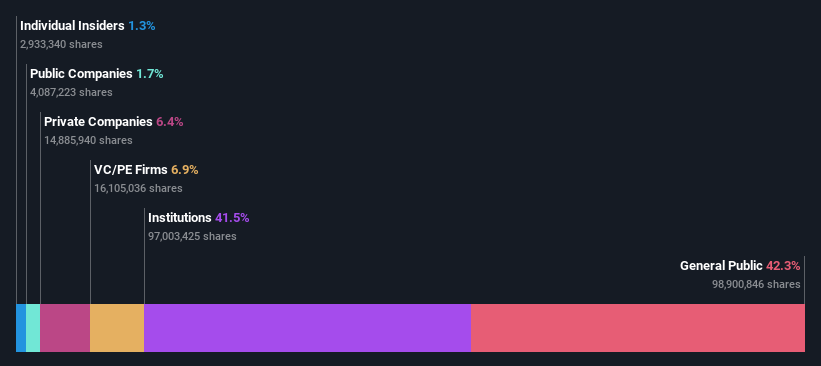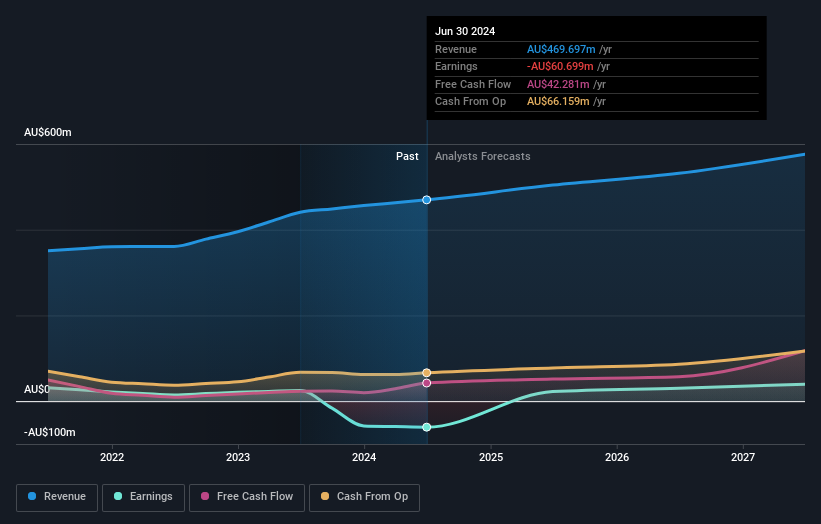- Australia
- /
- Healthcare Services
- /
- ASX:IDX
While institutions invested in Integral Diagnostics Limited (ASX:IDX) benefited from last week's 16% gain, retail investors stood to gain the most

Key Insights
- Significant control over Integral Diagnostics by retail investors implies that the general public has more power to influence management and governance-related decisions
- A total of 16 investors have a majority stake in the company with 50% ownership
- Institutions own 41% of Integral Diagnostics
Every investor in Integral Diagnostics Limited (ASX:IDX) should be aware of the most powerful shareholder groups. We can see that retail investors own the lion's share in the company with 42% ownership. In other words, the group stands to gain the most (or lose the most) from their investment into the company.
While retail investors were the group that reaped the most benefits after last week’s 16% price gain, institutions also received a 41% cut.
Let's delve deeper into each type of owner of Integral Diagnostics, beginning with the chart below.
See our latest analysis for Integral Diagnostics

What Does The Institutional Ownership Tell Us About Integral Diagnostics?
Institutional investors commonly compare their own returns to the returns of a commonly followed index. So they generally do consider buying larger companies that are included in the relevant benchmark index.
We can see that Integral Diagnostics does have institutional investors; and they hold a good portion of the company's stock. This suggests some credibility amongst professional investors. But we can't rely on that fact alone since institutions make bad investments sometimes, just like everyone does. When multiple institutions own a stock, there's always a risk that they are in a 'crowded trade'. When such a trade goes wrong, multiple parties may compete to sell stock fast. This risk is higher in a company without a history of growth. You can see Integral Diagnostics' historic earnings and revenue below, but keep in mind there's always more to the story.

We note that hedge funds don't have a meaningful investment in Integral Diagnostics. The company's largest shareholder is Yarra Funds Management Limited, with ownership of 8.6%. For context, the second largest shareholder holds about 6.9% of the shares outstanding, followed by an ownership of 5.0% by the third-largest shareholder.
After doing some more digging, we found that the top 16 have the combined ownership of 50% in the company, suggesting that no single shareholder has significant control over the company.
While it makes sense to study institutional ownership data for a company, it also makes sense to study analyst sentiments to know which way the wind is blowing. There are plenty of analysts covering the stock, so it might be worth seeing what they are forecasting, too.
Insider Ownership Of Integral Diagnostics
While the precise definition of an insider can be subjective, almost everyone considers board members to be insiders. Management ultimately answers to the board. However, it is not uncommon for managers to be executive board members, especially if they are a founder or the CEO.
Insider ownership is positive when it signals leadership are thinking like the true owners of the company. However, high insider ownership can also give immense power to a small group within the company. This can be negative in some circumstances.
We can report that insiders do own shares in Integral Diagnostics Limited. It has a market capitalization of just AU$695m, and insiders have AU$8.7m worth of shares, in their own names. Some would say this shows alignment of interests between shareholders and the board. But it might be worth checking if those insiders have been selling.
General Public Ownership
With a 42% ownership, the general public, mostly comprising of individual investors, have some degree of sway over Integral Diagnostics. While this size of ownership may not be enough to sway a policy decision in their favour, they can still make a collective impact on company policies.
Private Equity Ownership
With an ownership of 6.9%, private equity firms are in a position to play a role in shaping corporate strategy with a focus on value creation. Sometimes we see private equity stick around for the long term, but generally speaking they have a shorter investment horizon and -- as the name suggests -- don't invest in public companies much. After some time they may look to sell and redeploy capital elsewhere.
Private Company Ownership
It seems that Private Companies own 6.4%, of the Integral Diagnostics stock. It might be worth looking deeper into this. If related parties, such as insiders, have an interest in one of these private companies, that should be disclosed in the annual report. Private companies may also have a strategic interest in the company.
Next Steps:
It's always worth thinking about the different groups who own shares in a company. But to understand Integral Diagnostics better, we need to consider many other factors. To that end, you should be aware of the 1 warning sign we've spotted with Integral Diagnostics .
If you are like me, you may want to think about whether this company will grow or shrink. Luckily, you can check this free report showing analyst forecasts for its future.
NB: Figures in this article are calculated using data from the last twelve months, which refer to the 12-month period ending on the last date of the month the financial statement is dated. This may not be consistent with full year annual report figures.
New: AI Stock Screener & Alerts
Our new AI Stock Screener scans the market every day to uncover opportunities.
• Dividend Powerhouses (3%+ Yield)
• Undervalued Small Caps with Insider Buying
• High growth Tech and AI Companies
Or build your own from over 50 metrics.
Have feedback on this article? Concerned about the content? Get in touch with us directly. Alternatively, email editorial-team (at) simplywallst.com.
This article by Simply Wall St is general in nature. We provide commentary based on historical data and analyst forecasts only using an unbiased methodology and our articles are not intended to be financial advice. It does not constitute a recommendation to buy or sell any stock, and does not take account of your objectives, or your financial situation. We aim to bring you long-term focused analysis driven by fundamental data. Note that our analysis may not factor in the latest price-sensitive company announcements or qualitative material. Simply Wall St has no position in any stocks mentioned.
About ASX:IDX
Integral Diagnostics
A healthcare services company, engages in the provision of diagnostic imaging services to general practitioners, medical specialists, and allied health professionals and their patients in Australia and New Zealand.
Reasonable growth potential and fair value.


